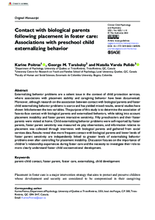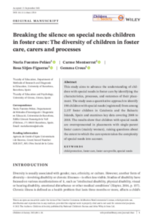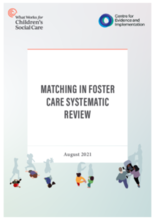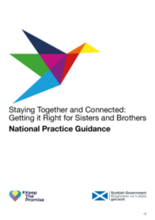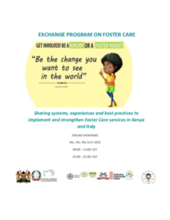Displaying 151 - 160 of 2222
The purpose of this study is to determine the association of face-to-face contact with biological parents and externalized behaviors, while taking into account placement instability and foster parent interactive sensitivity.
This study aims to advance the understanding of children with special needs in foster care by identifying the characteristics, processes, and outcomes of their placement. The study uses a quantitative approach to identify 190 children with special needs (registered) from among 2,157 foster children in Catalonia and the Balearic Islands, Spain and examines key data covering 2008 to 2018. The results show that children with special needs are overrepresented in placements with single-parent foster carers (mainly women), raising questions about the extent to which the care system takes the complexity of special needs into account.
These presentations from Hope and Homes for Children, Miracle Foundation and Railway Children were delivered during the August 20, 2021, workshop of the Care Measurement Task Force of the Transforming Children's Care Global Collaborative Platform. The focus of the workshop was child and family outcome measurement.
A systematic review exploring the lived experience of matching children with foster families and examining the evidence on the outcomes of matching decisions.
This document presents guidance supporting implementation of the new duties for Scottish local authorities: that every looked after child will live with their brothers and sisters, where appropriate to do so.
This two-part investigation looks into Los Angeles County’s Department of Children and Family Services (DCFS), the largest child welfare agency in the U.S., and what happens when the system that is meant to protect these children falls short—and even puts their lives at risk.
The Kenya-Italy “Virtual Exchange Program on Foster Care” aims to create a platform for learning, networking and sharing knowledge and best practices on Foster Care among different government stakeholders, from Kenya and Italy.
The exchange program took place on 5th, 7th and 9th July 2021.
This systematic review explores foster children’s and foster parents’ perceptions of factors related to a successful placement.
In this paper, authors demonstrate how a structured functional well-being assessment can be used with the custody population to promote an understanding of behavioral health needs, inform case planning, and measure functional improvement over time.
For this study, semi-structured interviews were conducted with 27 foster children placed in long-term family foster care about their experiences regarding “school.”

